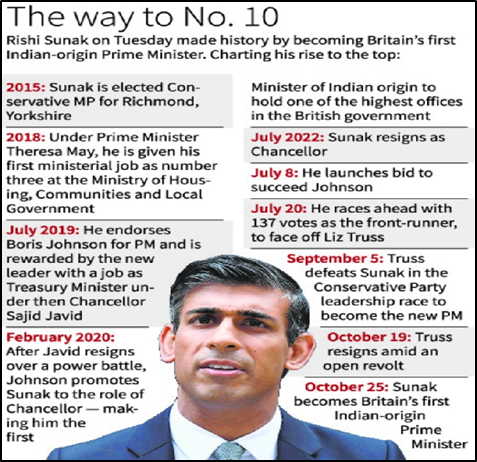In News:
- United Kingdom got its first-ever non-white Prime Minister in Rishi Sunak, the former Chancellor of the Exchequer and Britain’s youngest Prime Minister in recent times.
- Sunak, 42, is of Indian descent and was born to parents who migrated to Britain from East Africa.

What’s in Today’s Article:
News Summary
- Rishi Sunak took charge as the 57th Prime Minister of the United Kingdom. He takes over the reins at a time when the UK is facing one of its gravest economic and political crises in recent times.
- He is the country’s third PM in 50 days after first Boris Johnson and then Liz Truss were forced from office by a rebellion within the ruling Conservative Party.
Challenges faced by Sunak
- A Stagnant Economy
- In terms of overall output (in US$), the economy has been largely stagnant since the start of the 2008 Global Financial Crisis.
- The decision to leave the EU made matters worse. It became tougher for the UK to trade with its closest trading partners in Europe.
- The higher compliance costs hit small businesses. Several businesses were forced to move out of the UK in order to protect their market share.
- The Covid disruption and the war in Ukraine further affected the British economy.
- Derailed Government Finances
- According to one report, in 2018–19, revenues were sufficient to cover day-to-day (current) spending.
- However, spendings made to mitigate the economic impact of the pandemic and associated lockdowns derailed the government finances.
- This essentially meant that in the years to come, the government would have to cut spending.
- A new round of austerity for public services is on the card for UK.
- Growing Cost of Living Crisis
- The war in Ukraine set off an unexpected energy price inflationary spiral.
- The UK’s retail inflation, which typically stayed below 2.5%, skyrocketed to double-digit historic highs.
- Coming on the back of reduced incomes and livelihoods, this inflationary pressure reduced the purchasing power of citizens.
- This has triggered labour action across several segments of British life.
- Workers across different sectors are either already on strike or threatening to go on strike.
- Decision of Truss government
- The Truss-Kwasi Kwarteng decision to increase spending (including giving tax cuts to the richest) by simply borrowing more further aggravated the situation.
- This spooked the markets; investors sold British assets such as gilts (government bonds) and currency.
- The resultant fall in the pound’s exchange rate made imports even costlier and the sale of gilts meant that interest rates across the economy skyrocketed.
- Re-establishing political stability
- Having a well-established polity is a key reason why developed countries such as the UK get the best terms in international trade and business.
- But the Conservative Party is a deeply divided house today.
- Hence, uniting the Tories is the necessary first step for any economic decision-making to be taken seriously by the markets.
India-U.K. ties under Sunak
- India's bilateral relations with the U.K. may well be poised to see greater two-way exchanges under Sunak.
- His vision for India-U.K. bilateral ties has gone beyond the opportunity for the U.K. to sell things in India, wanting Britain to also learn from India.
- This vision was presented by Sunak when he was a Chancellor.
- Sunak has openly called China the biggest enemy of the UK.
- This assumes significance as India shares contentious geopolitical relations with China.










